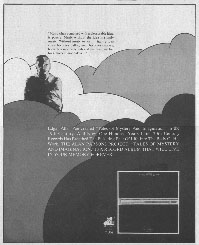![]()
  |

Tales Of Mystery And Imagination
The Alan Parsons Project
20th Century 508
Released: May 1976
Chart Peak: #38
Weeks Charted: 46
Tales of Mystery and Imagination undertakes the difficult task of transforming some of Edgar Allan Poe's writings into music. Alan Parsons, best known for engineering Pink Floyd's Dark Side of the Moon, conceptualized the project with Poe "appreciator" Eric Woolfson. Andrew Powell arranged and conducted the orchestra and choir that dominate the album and there are vocal appearances by John Miles, the Hollies' Terry Sylvester and Arthur Brown, among others.
Unfortunately, the tension and sense of impending, surreal terror that underscore most of Poe's work simply didn't get transferred into the musical interpretations. Arthur Brown's unique vocal ravings on "The Tell-Tale Heart" come closest because they supply the necessary dose of hysteria. The most ambitious track, "The Fall of the House of Usher," rises majestically with a Fantasia-like opening and a spectacular thunderstorm, then shifts into intermezzo and pavane passages that are quite moving. But the atonal, chaotic "fall" seems more an intrusion on the rest of the opus than the holocaustal finale it should have been.
 Click image for larger view. |
- Billy Altman, Rolling Stone, 9-23-76.
Bonus Reviews!
The Alan Parsons Project consists of Parsons, who began as an assistant engineer on the Beatles Abbey Road album and has since gone on to become a producer; Eric Woolfson, whose unfortunate idea it was to drub poor old Edgar Allan Poe's works into a rock fantasy; and arranger-conductor Andrew Powell. The three have collaborated here on an album in which the engineering is trickily superb, but the pretension is so think and the execution of the original idea of adapting some of Poe's most famous chestnuts is so sloppy and pointless that one might as well be listening to the Very Uncollected Thoughts of Sara Teasdale on the day she discovered speed. The songs at least have the virtue of brevity, but the flatulent "tone poem" that has been constructed around the title of "The Fall of the House of Usher" flows on and on like a river of treacle. At its best it sounds a bit like an old Korngold score for an Ida Lupino melodrama of the Forties; at its worst, well, the closes I can come is Ibert's "Escales" played backwards on a synthesizer.
- Peter Reilly, Stereo Review, 9/76.
Producer/engineer Parsons and Eric Woolfson come up with the interesting idea of creating a musical atmosphere based on some of Poe's better and darker works. The result, with the help of Arthur Brown, John Miles, Terry Silvester and the members of Pilot, is a worthy blend of European rock and symphonic sounds. A few vocals, with the words coming from or based on Poe. Side one is the most appealing and most commercial with five selections and a number of the catchy hooks that make the European/Pink Floyd school of rock so effective. Good synthesizer, guitar and strings. How important the Poe concept is is questionable, but the LP as a whole holds up well as a viable musical work. Strong FM potential. Arthur Brown is the highlight vocalist. Instrumentation from sparse to lush and full. Best cuts: "Tell Tale Heart," "The Cask Of Amontillado," "Full" (one segment of "The Fall Of The House Of Usher," which takes most of side 2).
- Billboard, 1976.
This "project," led by former Beatles engineer Alan Parsons, was recorded at Abbey Road and featured a session group including Terry Sylvester and Arthur Brown (he of the "Crazy World"). It made its first and best album (if not its most popular one) by interpreting the ominous poems and stories of Edgar Allan Poe. Heavy on synthesized keyboards and dramatic choral parts, it's rock soundtrack music minus the film. The group went on to make a series of similar followups, notably including I Robot and Eye in the Sky, but this is the place to start. * * * *
- William Ruhlmann, The All-Music Guide to Rock, 1995.
Of the Alan Parsons Project's individual efforts, Tales of Mystery and Imagination - Edgar Allan Poe (1976) and Turn of a Friendly Card (1980) are the most thematically cohesive. * * *
- Gary Graff, Musichound Rock: The Essential Album Guide, 1996.
![]() Reader's Comments
Reader's Comments
No comments so far, be the first to comment.